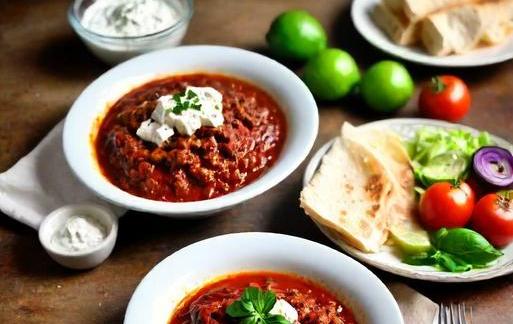- You are here:
- Home »
- Food
- » [REVEALED] Greek Foods That Start With H
[REVEALED] Greek Foods That Start With H
Note: This page contains affiliate links.
As an Amazon Associate, I earn from qualifying purchases when you click on the link, but you are not charged extra.
Greek cuisine is renowned for its rich flavors, wholesome ingredients, and deep-rooted cultural significance. From the sun-drenched landscapes of the Aegean to the bustling markets of Athens, Greek food reflects a history that spans thousands of years. In this gastronomic exploration, we delve into the world of Greek foods that start with the letter “H”. From hearty main courses to delectable desserts, the Hellenic culinary repertoire offers a diverse array of delights for every palate.
Contents
- 1 List Of Greek Foods That Start With H
- 1.1 1. Horta (Wild Greens)
- 1.2 2. Horiatiki Salad
- 1.3 3. Halva
- 1.4 4. Hummus
- 1.5 5. Htapodi (Grilled Octopus)
- 1.6 6. Horta Vrasta Me Fasolakia (Boiled Greens With Green Beans)
- 1.7 7. Htipiti
- 1.8 8. Hunkar Begendi
- 1.9 9. Htapothi Sti Skara (Grilled Cuttlefish)
- 1.10 10. Honey-Laden Desserts
- 1.11 11. Hilopites
- 1.12 12. Honey Yogurt
- 1.13 13. Hortopita
- 1.14 14. Horta Ladera
- 1.15 15. Horiatiko Psomi
- 2 Significance
- 3 Category-Related
- 4 Common Themes
- 5 Interesting Facts
- 6 Conclusion
List Of Greek Foods That Start With H

1. Horta (Wild Greens)
- Description: Horta is a traditional Greek dish made from wild greens such as dandelion, chicory, or mustard greens. These nutrient-rich greens are boiled or steamed and often drizzled with olive oil and lemon juice. Horta exemplifies the simplicity and health-conscious nature of Greek cuisine.
2. Horiatiki Salad
- Description: Commonly known as the Greek salad, Horiatiki is a refreshing medley of tomatoes, cucumbers, olives, and feta cheese. The salad is seasoned with oregano and dressed with olive oil, creating a harmonious blend of textures and flavors that captures the essence of Mediterranean dining.
3. Halva
- Description: Halva is a sweet treat that holds a special place in Greek desserts. Made from ground sesame seeds, sugar, and sometimes flavored with cocoa or vanilla, halva has a crumbly texture and a rich, nutty taste. It is often garnished with almonds or pistachios, adding a delightful crunch.
4. Hummus
- Description: While hummus has Middle Eastern origins, it has become a popular appetizer in Greek cuisine. This creamy blend of chickpeas, tahini, olive oil, lemon juice, and garlic is served with pita bread or vegetables. It adds a touch of the exotic to Greek mezze spreads.
5. Htapodi (Grilled Octopus)
- Description: Htapodi showcases the Greeks’ love for seafood. Tenderized octopus is marinated in olive oil, lemon, and herbs, then grilled to perfection. This dish exemplifies the Mediterranean’s bounty and the Greek talent for transforming simple ingredients into culinary masterpieces.
6. Horta Vrasta Me Fasolakia (Boiled Greens With Green Beans)
- Description: This is a heartwarming dish that combines horta (wild greens) with green beans. The vegetables are boiled and then drizzled with olive oil, creating a nutritious and comforting side dish. It reflects the resourcefulness of Greek cuisine, making the most of locally available ingredients.
7. Htipiti
- Description: Htipiti is a flavorful spread made from feta cheese, roasted red peppers, olive oil, and various herbs and spices. It’s often served as a dip with bread or vegetables. The tangy and smoky notes of Htipiti make it a popular addition to Greek mezzes, offering a burst of Mediterranean flavors.
8. Hunkar Begendi
- Description: Hunkar Begendi, meaning “Sultan”s Delight”, is a Turkish-inspired dish that has become part of Greek cuisine. It features slow-cooked lamb stew served over a bed of creamy eggplant puree. The succulent lamb combined with the velvety eggplant creates a dish fit for royalty.
9. Htapothi Sti Skara (Grilled Cuttlefish)
- Description: This dish celebrates the bounty of the Aegean Sea. Cuttlefish, tenderized and marinated, is grilled to perfection, creating a delightful seafood experience. The Greeks showcase their expertise in preparing seafood with simple yet effective techniques, allowing the natural flavors to shine.
10. Honey-Laden Desserts
- Description: Greek desserts often feature honey as a key ingredient. Classics like Baklava, a layered pastry of phyllo dough, nuts, and honey, and Loukoumades, deep-fried dough balls soaked in honey and sprinkled with cinnamon, showcase the Greeks’ sweet tooth and their mastery in creating indulgent treats.
11. Hilopites
- Description: Hilopites are traditional Greek egg noodles, often square or diamond-shaped. These pasta-like squares are commonly used in soups or baked dishes, providing a comforting and hearty texture. Hilopites showcase the Greek talent for transforming simple ingredients into comforting culinary delights.
12. Honey Yogurt
- Description: Greek yogurt, known for its thick and creamy texture, is elevated with the addition of honey. This simple yet exquisite combination is a staple in Greek breakfasts and desserts. The juxtaposition of tangy yogurt and sweet honey creates a harmonious balance that tantalizes the taste buds.
13. Hortopita
- Description: Hortopita is a savory pie that features a filling of mixed greens, herbs, and feta cheese encased in layers of phyllo pastry. This dish exemplifies the Greek skill in combining fresh, local ingredients to create a wholesome and satisfying culinary experience.
14. Horta Ladera
- Description: Horta Ladera is a dish where wild greens are simmered with tomatoes, onions, and olive oil. The slow cooking process allows the flavors to meld, creating a delicious and nutritious dish. It embodies the Greek philosophy of simplicity, letting the natural taste of ingredients shine.
15. Horiatiko Psomi
- Description: Horiatiko Psomi, or country-style bread, is a staple in Greek households. Made with simple ingredients like flour, water, yeast, and salt, this rustic bread has a hearty crust and a soft interior. It’s often enjoyed with olive oil, feta, and olives, reflecting the quintessential Greek way of savoring bread.
Greek cuisine is a captivating tapestry woven with the threads of history, culture, and the bounties of the land and sea. From the humble Horta to the exquisite Hunkar Begendi, each dish reflects the Greeks’ passion for good food made from fresh, local ingredients. The exploration of Greek foods that start with ‘H’ not only provides a glimpse into the culinary traditions of Greece but also underscores the importance of simplicity, balance, and a deep connection to nature in Greek gastronomy. So, whether you’re indulging in the sweetness of Honey-Laden Desserts or savoring the smokiness of Htapiti, each bite transports you to the sun-soaked landscapes of Greece, where food is not just sustenance but a celebration of life itself.
Significance

Greek cuisine is a rich tapestry of flavors, blending traditional ingredients with centuries-old recipes. Among the diverse array of dishes, exploring Greek foods that start with the letter ‘H’ opens up a world of culinary delights. From hearty mains to delectable desserts, the Greek ‘H’ gastronomic journey is a captivating experience.
Greek cuisine holds a special place in the hearts of food enthusiasts globally, renowned for its emphasis on fresh, high-quality ingredients and distinctive flavors. The Mediterranean diet, of which Greek cuisine is a prominent representative, is celebrated for its health benefits. Olive oil, fresh vegetables, grains, and a variety of herbs contribute to the nutritional richness of Greek dishes.
The ‘H’ foods in Greek cuisine reflect this commitment to quality, offering a mix of savory and sweet options that showcase the country’s culinary prowess. Each dish tells a story of tradition, culture, and the love Greeks have for sharing meals with family and friends.
Category-Related

1. Horiatiki Salata (Greek Salad)
Horiatiki Salata, or Greek Salad, is a quintessential dish that needs no introduction. Comprising tomatoes, cucumbers, olives, feta cheese, and oregano, this salad is a refreshing start to any Greek meal. The combination of juicy tomatoes and creamy feta creates a harmonious balance of textures, while the olive oil and oregano add a burst of flavor.
2. Hummus
While hummus has Middle Eastern origins, it has seamlessly integrated into Greek cuisine. Made from blended chickpeas, tahini, lemon juice, and garlic, hummus is a versatile dip served with pita bread or as an accompaniment to other dishes. Its popularity in Greek eateries underscores the Mediterranean culinary exchange.
3. Htapodi (Grilled Octopus)
Htapodi is a tantalizing Greek dish featuring grilled octopus. Marinated in olive oil, lemon, and herbs, the octopus is cooked to perfection, resulting in a tender and flavorful delicacy. Often served with a drizzle of olive oil and a sprinkle of oregano, htapodi is a testament to Greek mastery in seafood preparation.
4. Halva
A sweet treat with a long history, halva is a dessert made from ground sesame seeds or semolina, mixed with honey or sugar. The result is a dense, confectionery delight that comes in various flavors. A staple during religious celebrations and special occasions, halva showcases the Greeks’ ability to turn simple ingredients into exquisite sweets.
5. Horta Vrasta (Boiled Greens)
Horta vrasta is a traditional Greek dish highlighting the country’s emphasis on healthy eating. Consisting of boiled wild greens, usually dandelion or chicory, this dish is often drizzled with olive oil and lemon juice. Simple yet flavorful, horta vrasta reflects the Greek commitment to incorporating nature’s bounty into everyday meals.
Common Themes
1. Mediterranean Diet Influence
The ‘H’ foods in Greek cuisine are deeply rooted in the Mediterranean diet, emphasizing the consumption of fresh fruits, vegetables, whole grains, and olive oil. These ingredients not only contribute to the vibrant flavors but also promote a healthy lifestyle. The use of olive oil, in particular, is a common thread that ties many Greek dishes together.
2. Culinary Heritage
Greek cuisine, including its ‘H’ foods, is a testament to the country’s rich culinary heritage. Passed down through generations, recipes often carry a sense of tradition and cultural significance. Whether it’s the meticulous preparation of htapodi or the simplicity of boiled greens, each dish tells a story of Greek life, connecting the past with the present.
3. Seasonal Variations
The use of seasonal ingredients is a prevalent theme in Greek cooking, ensuring that dishes are not only flavorful but also in harmony with nature. ‘H’ foods, like many other Greek dishes, often reflect the changing seasons. For instance, salads may feature ripe tomatoes in the summer, while hearty stews might take center stage during the colder months.
Interesting Facts
1. Olive Oil Production
Greece is a major player in the global olive oil market, and olive oil is a key component in many Greek dishes, including those starting with “H”. The country’s diverse climates contribute to the cultivation of numerous olive varieties, resulting in olive oils with distinct flavors and aromas.
2. Ancient Roots Of Halva
Halva, a popular Greek dessert, has ancient roots and is believed to have originated in the Byzantine Empire. Its enduring popularity showcases how traditional recipes continue to thrive and evolve over the centuries.
3. Celebration Of Seafood
Greek cuisine has a strong emphasis on seafood, and dishes like htapodi highlight the country’s love for fresh, expertly-prepared marine fare. The proximity to the Mediterranean Sea has influenced the Greek preference for seafood, making it a significant aspect of their culinary identity.
4. Health Benefits Of Greek Salad
The classic Greek Salad, with its medley of vegetables, olives, and feta cheese, is not just a delicious appetizer. It also aligns with the principles of the Mediterranean diet, offering a combination of antioxidants, healthy fats, and vitamins.
Conclusion
In the world of Greek cuisine, foods that start with ‘H’ contribute to a culinary journey that spans centuries. From the freshness of Horiatiki Salata to the sweetness of Halva, each dish encapsulates the essence of Greek life, reflecting a commitment to tradition, quality ingredients, and a love for sharing meals.
As we explore the significance, categories, common themes, and interesting facts surrounding Greek ‘H’ foods, it becomes clear that these dishes are not just meals; they are cultural ambassadors, carrying the stories of generations. The Mediterranean diet influence, culinary heritage, and seasonal variations add layers of depth to the gastronomic experience, making Greek cuisine a treasure trove for food enthusiasts.
So, the next time you savor a plate of htapodi or indulge in a spoonful of halva, remember that you are not just tasting food – you are partaking in a journey through Greek history, culture, and the enduring love affair with flavors that stand the test of time.


